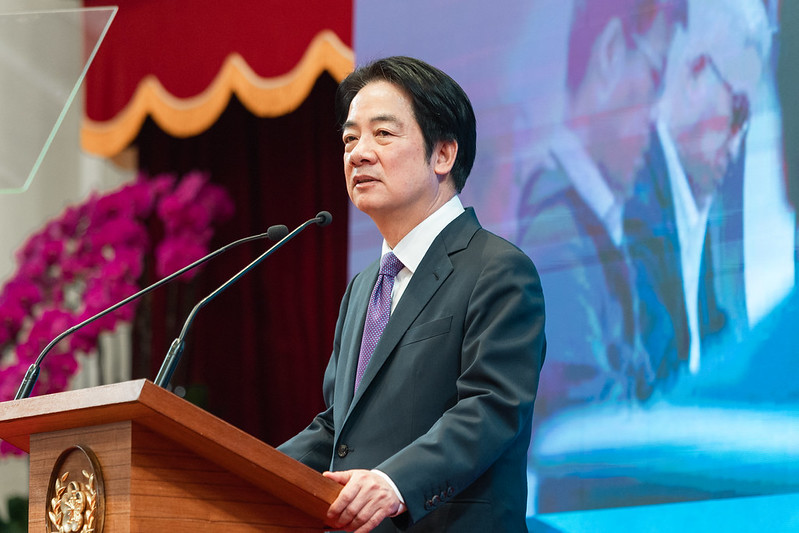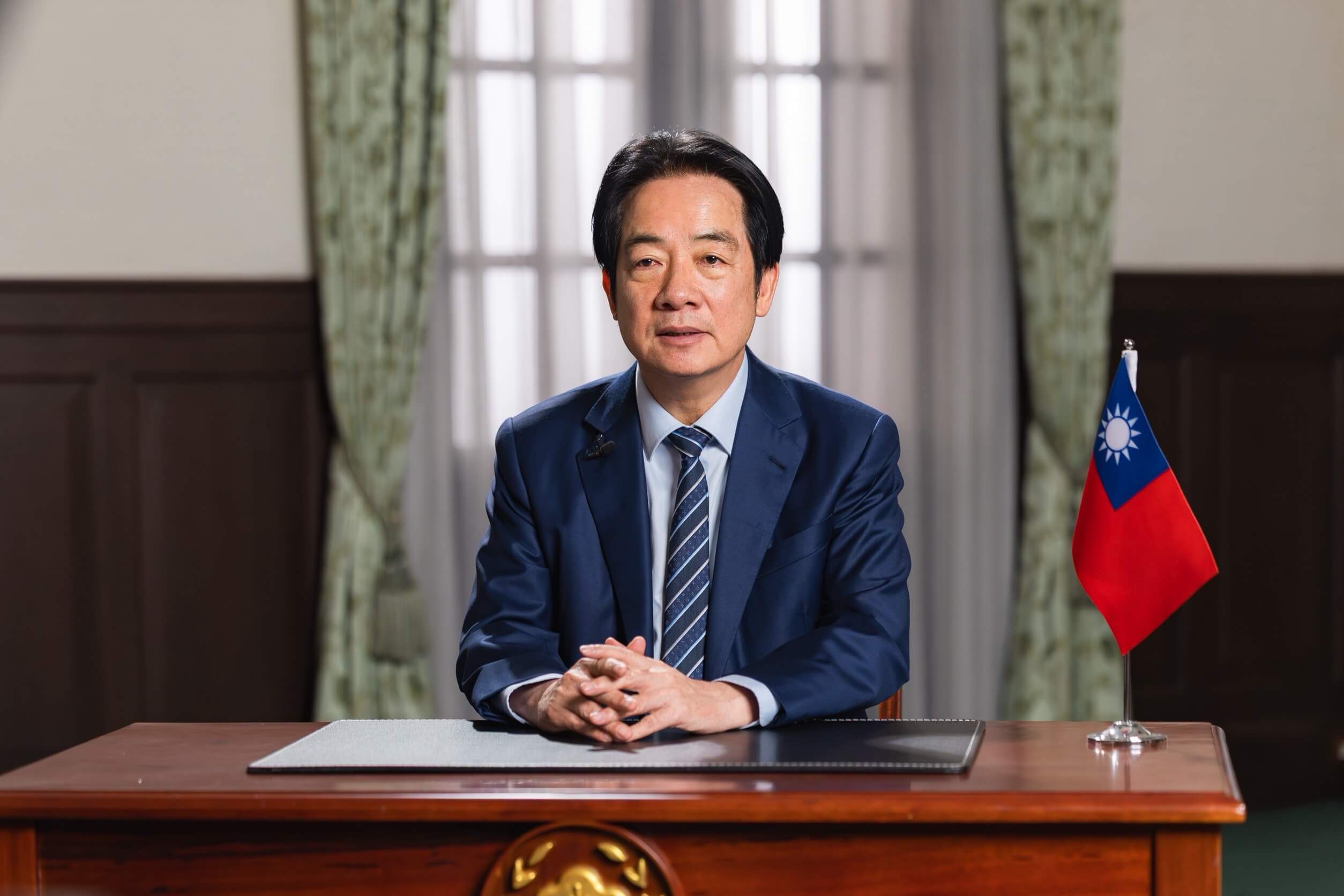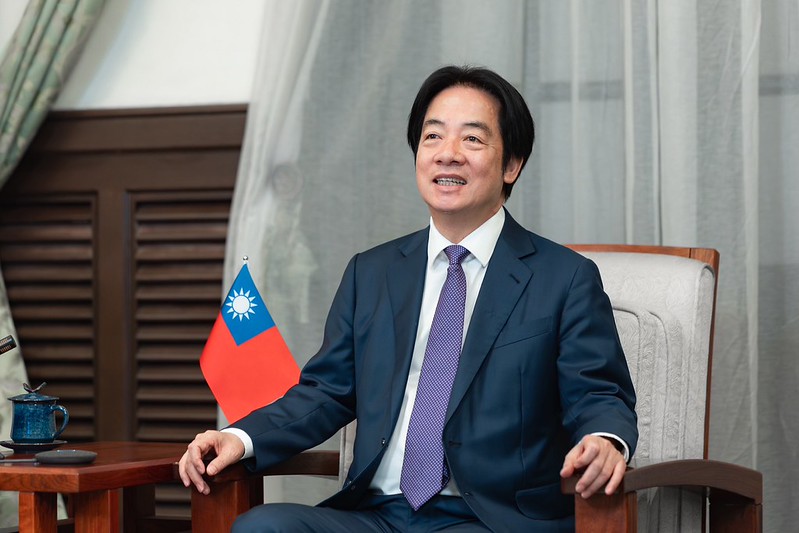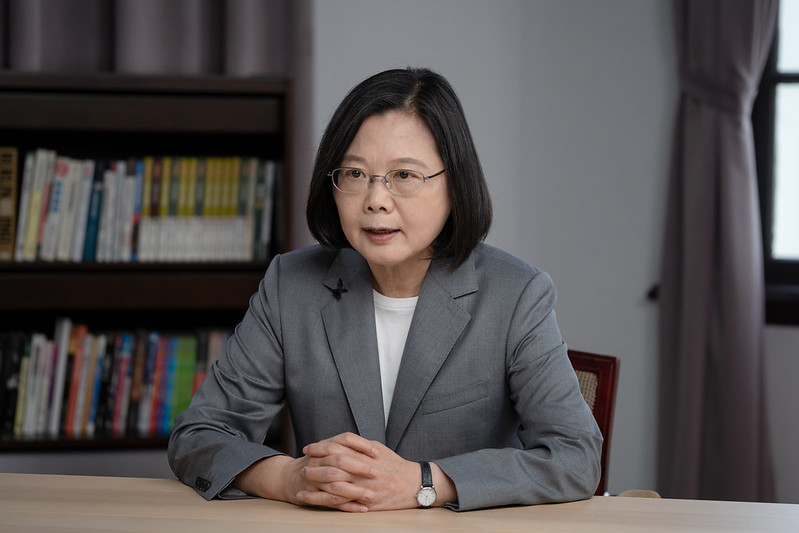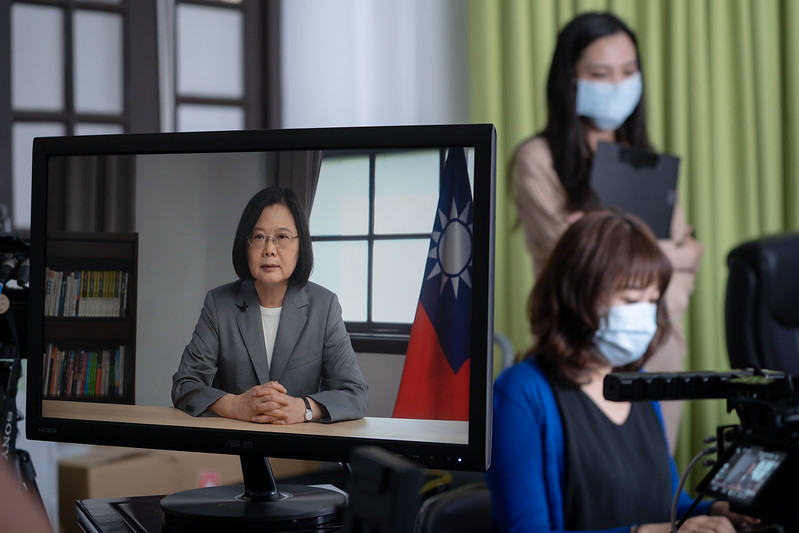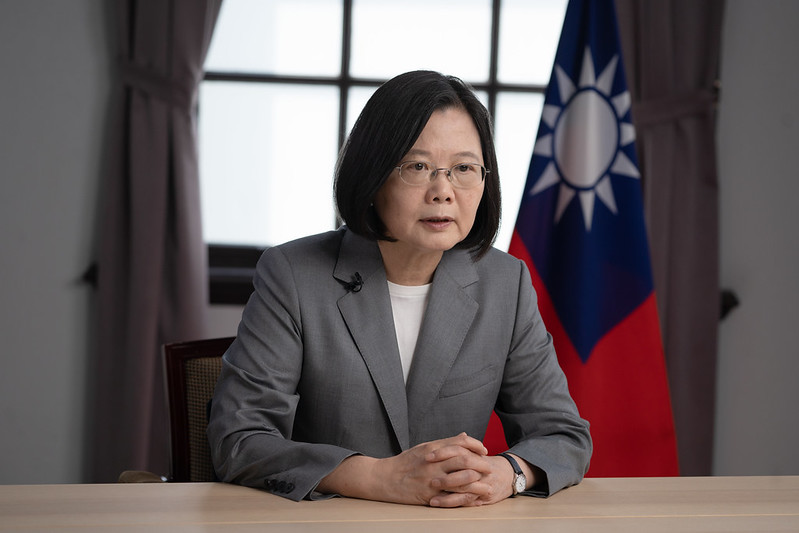News & activities
 News releases
News releases
At the invitation of US-based think tanks, the Hudson Institute and the Center for American Progress (CAP), President Tsai Ing-wen participated in a videoconference on the theme "President Tsai Ing-wen Discusses the Diplomatic, Security and Economic Challenges Facing Taiwan," delivering a speech entitled "Protecting Taiwan as a bastion of freedom in the Indo-Pacific."
Reiterating what she said in her inauguration speech this past May, President Tsai mentioned four principles in our management of cross-strait relations: peace, parity, democracy, and dialogue. With these four principles, she said, we will seek to continue our engagement across the Taiwan Strait and will always be willing to work together in the interests of peaceful coexistence and to prevent a downward trend in cross-strait relations. As for Taiwan-US relations, the president stated that in her second term, she will continue our cooperation with the US, adding that foremost amongst her priorities is to establish a constructive security relationship, built on the clear understanding of our shared interests in the region. The president said that the second area of focus is to begin negotiations towards a free trade agreement (FTA), and the third priority is to work with the US to strengthen engagement with other like-minded democracies.
Following is a transcript of President Tsai's remarks:
Good morning to you all our friends in Washington, DC. Thank you to Hudson Institute and the Center for American Progress for hosting this event. It's great to be with all of you through the internet, which the world is getting used to these days. And I want to express my appreciation to President [Kenneth] Weinstein and President [Neera] Tanden for your leadership during these challenging times.
People say that the second term is supposed to be easier than the first. They must be people that have not experienced the year 2020 like we have. We are gathered at a time when billions around the world are reeling from the unprecedented effects of COVID-19. When over half a million people have lost their lives and millions more have been sickened. There is tremendous economic uncertainty around the world, with soaring unemployment and disruptions to global trade.
While Taiwan has fared relatively well in the current pandemic, we are not immune to its aftershocks. My government has already unveiled a number of stimulus measures to get our economy back on track, to take care of workers and businesses that are especially vulnerable, and to ensure that our industries are well positioned following shifts in global supply chains. As a result of this, we have been able to maintain positive economic growth at a period of time when our neighbors are facing significant economic downturn.
While we are concerned about COVID-19's economic impact, we are also worried about its broader political implications across the region. When the rest of the world has been distracted in responding to one of the most significant crises in recent history, we have seen a growing effort to pose ever more challenging threats to free and democratic societies. Nowhere is this more apparent than in Hong Kong.
Taiwan holds deep historical and cultural ties with Hong Kong. Millions of people travel between the two places each year and thousands of Hong Kong students study in our universities.
We are the only two Chinese-speaking societies around the world that commemorate June 4th and its profound significance for freedom and democracy. As a result, we are saddened and alarmed to see this beacon of civil liberties become extinguished, in violation of the promises Beijing had made to the people of Hong Kong, as well as the international community.
We recognize the bravery of the people of Hong Kong. Earlier in July, hundreds of thousands of people turned out to vote in primary elections, despite the significant actions that have been taken to discourage them from doing so. We also see the international community as having an obligation to speak out and act against the demise of Hong Kong's freedoms. I applaud the actions that the UK, the US, and many other democracies have taken, and call on more like-minded countries to do the same.
In May, I visited the reopened Causeway Bay Books in Taipei, which had long been a symbol of freedom of speech in Hong Kong. The owner, Mr. Lam Wing-kee (林榮基), was detained and interrogated after crossing the border to Shenzhen, and came to Taiwan after fears that he would be extradited back to China. Cases like Mr. Lam inspired us to quickly establish a new Taiwan-Hong Kong Services and Exchange Office to provide humanitarian support and assist the people of Hong Kong in relocating to Taiwan.
The measures that have taken place against Hong Kong further exemplify how Taiwan is on the frontlines of freedom and democracy. This has made it all the more incumbent for my administration to prudently manage cross-strait policy in the next four years, so that we can maintain peace and stability, while protecting our freedoms and democracy.
This is why in my inauguration speech in May, I mentioned four principles in our management of cross-strait relations: that is peace, parity, democracy, and dialogue. "Peace" means we will seek continued peace with Beijing and call for the renunciation of force to settle our differences. "Parity" requires that both sides should not deny each other's existence. "Democracy" means Beijing must recognize that Taiwan is a democracy whose future is decided by our own people. And "dialogue" means we will not refrain from dialogue with Beijing that is not based on political preconditions.
With these four principles, we will seek to continue our engagement across the Taiwan Strait. We will always be willing to work together in the interests of peaceful coexistence and to prevent a downward trend in cross-strait relations. We will always acknowledge the historical and cultural ties that exist across the Strait. And we will never stop believing that there can be a better future ahead, where both sides can share in each other's successes and accomplishments.
But before this can take place, we must also be realistic and take stock of our differences. Taiwan has become a full-fledged democracy. Our 23 million people have the right to determine our own futures, which is antithesis to the position Beijing has taken.
Consequently, we must ensure that cross-strait interactions do not jeopardize our freedoms, democracy, and way of life. The people of Taiwan expect nothing less, from their democratically-elected government.
Upholding these principles requires us to be able to defend Taiwan against coercive actions. It entails backing up our words with actions. And this is precisely what I have in mind as I preside over the current round of capacity-building of our military. I am pleased that working together with our Legislature, last year we unveiled our largest ever defense budget, reaching 2.3% of our GDP. I fully expect that this number will continue to grow. But what will be equally important is ensuring that these resources are being spent on the right capabilities.
This is why I am committed to accelerating the development of asymmetric capabilities under the Overall Defense Concept. As I mentioned in my inauguration speech, this will be our number one priority.
We will also identify, develop, and expand capabilities that can more effectively utilize our geographical advantages.
Furthermore, we are deeply engaged in the reforms necessary to make our military even more effective. As an example of this, during the annual Han Kuang exercises in July, we introduced our new joint battalions, which have greater capacity to conduct independent operations. For the first time during the Han Kuang exercises, our reserves also participated in live-fire scenarios, showcasing their capacity to support and complement our regular forces, as well as play a critical role in our defense strategies. Moving forward, we will continue to expedite the implementation of these reforms, in order to transform our military into an even more effective force.
As effective our military is, we cannot stand alone without support from the community of like-minded democracies. I am proud that the relationship between Taiwan and the US has never been closer.
Across the board, we share a high degree of mutual trust and a common strategic picture of how we can work together to protect and preserve a Free and Open Indo-Pacific. I am pleased that my new representative to the US, Bi-khim Hsiao, has arrived in Washington, DC and looks forward to engaging in more of these discussions.
In my second term, I will continue our cooperation with the US. Foremost amongst my priorities is to establish a constructive security relationship, built on the clear understanding of our shared interests in the region.
I am confident that our common acknowledgement of challenges in the region transcends politics and political parties. Through more frank and robust policy-level dialogue, we want to forge greater consensus on ways we can preserve peace across the Taiwan Strait.
The second area of focus is to begin negotiations towards an FTA. Past months have shown us the importance of economic linkages and supply chain security for both Taiwan and the US. TSMC has announced that it will be building a state-of-the-art facility in Arizona. Over the past year, American companies such as Google and Microsoft have substantially increased their investments in Taiwan.
We must be clear-eyed on how we can move forward on an FTA. For too long, closer trade relations have been hindered by technicalities that account for just a small fraction of two-way trade.
We want to work together to resolve these issues, in a way that is safe for our consumers and also consistent with established scientific standards. I believe that the people of Taiwan can see the value and wisdom in building closer economic relations with the US. And conversely, we hope that the US recognizes the broader strategic implications such an agreement would undoubtedly have.
My third priority is to work with the US to strengthen engagements with other like-minded democracies. We have noticed the US' efforts to build greater awareness in Europe, Asia, Africa, and many other places about the challenges posed by authoritarian actors.
At the Copenhagen Democracy Summit held in June, I saw first-hand the growing consensus amongst like-minded countries about the need to take a forceful stance in defense of global democracy. A very first step can be more institutional and cohesive support for Taiwan's participation in international institutions.
In January this year, over 14 million Taiwanese lined up in polls to cast their votes for the future of our country, one of the highest levels of turnout in our history. The people of Taiwan could not be more proud of our democracy and all that we have accomplished. They exemplify how democracy is not a western phenomenon, or as some people claim, incompatible with certain cultures. The right of the people to choose how they are governed is a universal aspiration and an inalienable right.
As President, it is incumbent on me to protect these rights and to make certain that they will be passed down to future generations. Taiwan stands on the frontlines in the defense of democratic values. The gravity of the threat we face signifies the difficulty of the task before us.
But by standing as one, as a community of like-minded democracies, I am confident we will rise to successfully meet the challenge. Together, we will continue to safeguard Taiwan as a bastion of freedom and democracy in the Indo-Pacific region.
Thank you all for joining me. I look forward to a robust dialogue in the time ahead.
The videoconference was broadcast at 9:00 a.m. EDT, Wednesday, August 12 (evening of August 12 Taipei time) on the official websites of the Washington DC-based co-hosts, the Hudson Institute, a conservative think tank, and the CAP, a liberal think tank, both of which are influential in policy-making circles and representative of their respective constituencies. This is a significant, benchmark event that clearly demonstrates the strong bipartisan support that Taiwan and the Taiwan-US relationship enjoy in the US.
Hudson Institute Chief Operating Officer John Walters and CAP President and Chief Executive Officer Neera Tanden delivered opening remarks. Other participants included Director of the Hudson Institute's Center for American Seapower Seth Cropsey, Vice President of CAP's National Security and International Policy Kelly Magsamen, and Taiwan Representative to the US Hsiao Bi-khim (蕭美琴)

